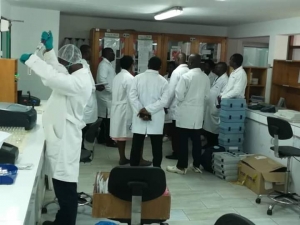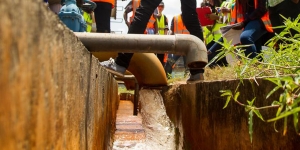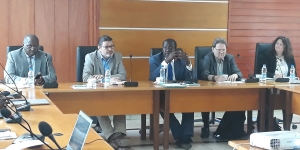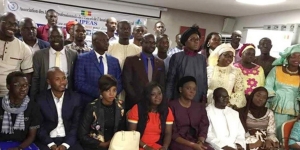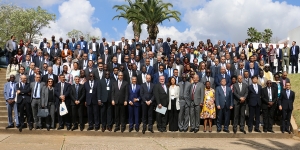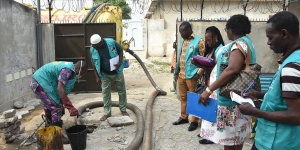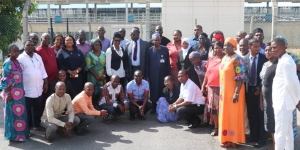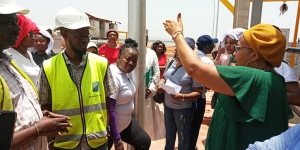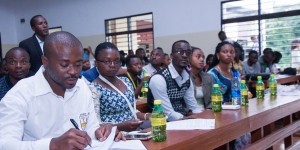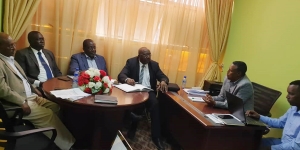Nzickonan Stéphanie
IMPROVING THE PERFORMANCE OF WATER QUALITY ANALYSIS LABORATORIES: SODECI AND ONEP ARE MAKING MAJOR PROGRESS
An assessment mission was organised by AfWA as part of the monitoring of the Performance Improvement Plan (PAP) of the laboratories of water utilities benefiting from the support of component 3 of the AfriCap programme of AfWA, funded by the United States Agency for International Development (USAID) and focused on building the capacity of African Water Operators' Capacities in Water Quality Management through peer partnerships.
The mission was led by an expert from “Office National de l’Eau et de l’Assainissement” (ONEA) of Burkina Faso, Mr Francis D. Kéré, and took place from 20 to 22 May 2019 in Côte d'Ivoire. The objective of this mission was to assess the progress of the implementation of the PAPs of ONEP and SODECI Water Quality Analysis Laboratories. The assessment revealed satisfactory results in terms of implementation of the PAPs. As regards SODECI, it appears that 28% of the PAP activities have been completed compared with 50% in progress. On ONEP side, it is noted that 55% of PAP activities have been completed compared with 38% in progress.
These very encouraging results clearly confirm the willingness and support of the Senior Management of these companies to achieve the objectives set for their laboratories. At the end of the mission, Mr Francis D. Kéré expressed his satisfaction with the progress made, but above all with the motivation of laboratory managers to improve their performance in order to offer quality services to the population. He was also pleased to note that the Directors of both Companies attach particular importance to water quality, which is something that should be put to the benefit of AfWA. This made water quality an essential element of its mission. He expressed the wish that this considerable support from AfWA would be extended to all water utilities that are members of the Association.
TWO NIGERIAN STATE WATER UTILITIES HAVE RECENTLY JOINED THE AFRICAN WATER ASSOCIATION
AfWA’s reputation is reflected in the periodic membership of new members. Indeed, after the Federation of Water and Sanitation Utilities of Ethiopia became a member, it is now the turn of the Federal Capital Territory Water Board (Abuja) and the Ogun State Water Corporation (Ogun State Water Corporation), two Nigerian water utilities, to join the largest platform of water and sanitation operators in Africa: AfWA.
Since 2014, through the implementation of the Water Operators Partnership Africa (WOP Africa) Programme, AfWA has been exposed to stakeholders in Nigeria's water and sanitation sector through a Knowledge Sharing Expert made available by the Nigerian Water Utilities Association. This collaboration has continued in the context of the implementation of AfWA Capacity Building Programme (AfriCap) over the 2016-2019 period and it is in such a context that these two companies: Abuja Federal Capital Territory Water Board and Ogun State Water Corporation, also involved in AfWA Water Quality Management Project, have just signed their full AfWA membership. Abuja Federal Capital Territory Water Board's mission is to provide the people of Abuja, the federal capital, with clean drinking water using the best industrial technology and a highly-skilled workforce to provide exceptional services. Ogun State Water Corporation's mission is to provide efficient, sufficient and sustainable drinking water services to the people of Ogun State at affordable rates.
For General Managers of these two water utilities, AfWA membership makes their companies members of the largest and most dynamic network of water and sanitation operators in Africa, which will allow them to partner with other water and sanitation organisations and tap into the vast pool of professionals available in the continent to achieve their drinking water supply objectives in the country.
GERMAN WATER PARTNERSHIP (GWP)-AfWA PARTNERSHIP: AN INNOVATIVE COLLABORATION FOR EFFICIENT SUPPORT TO WATER AND SANITATION OPERATORS IN AFRICA.
An evaluators' delegation from the German Ministry for Development Cooperation (BMZ) led by the German Water Partnership (GWP) is on mission from May 13 till May 17, at AfWA's headquarters in Abidjan. The mission intends to fund a collaborative project between AfWA and the GWP to build the capacity of African water and sanitation sector actors. The delegation, which includes Jurgen Henkel, Project Director of SEQUA gGmbH, Marcus Casel, SEQUA gGmbH consultant and Nathalie Kolbe, Head of International Projects at the German Water Partnership, met with the staff of AfWA’s Executive Office to understand its management and actions’ plan. Thus, Mr. Usher, Executive Director, made a brief presentation of the Association and the Director of Programs, Dr. Siméon Kenfack followed by a presentation of the various ongoing and future programmes implemented by AfWA. The discussions that followed clarified the grey areas.
At the end of the first working session and before continuing their mission, the delegation expressed overall satisfaction with the information they received. According to Mr Jürgen Henkel, AfWA has the required skills to receive funding from the German Ministry of Cooperation because of its experience in the implementation of donor-funded projects. For him, new activities could be added to its portfolio to strengthen its capacities.
The delegation's agenda includes meetings in Abidjan with some AfWA members, particularly SODECI, ONEP, ONAD, SOTICI, the Presidents of the Scientific and Technical Council, Dr Papa Samba Diop and Dr Rose Kaggwa; working sessions are also planned with the sector’s ministries and the German Embassy. The German Water Partnership is an association of 350 companies, research centers and other organizations operating in the water sector.
The final evaluation meeting on Friday will recap the main conclusions of the mission and an outlook of this future collaboration.
GENERAL ASSEMBLY OF THE YOUNG PROFESSIONALS IN WATER AND SANITATION OF SENEGAL: DAME NDIAYE PASSES THE TORCH TO FATIMATOU SALL
After six years devoted to structuring their association and positioning it as a civil, advisory and useful entity in the water and sanitation sector in Senegal, Senegal's young water and sanitation professionals, gathered in the AYPWS (Association of Young Professionals in Water and Sanitation of Senegal), held their first ordinary General Assembly on April 27, 2019 in Dakar.
Chaired by Mr. Lansana Gagny SAKHO, President of the Senegalese Committee of the African Water Association and also Managing Director of ONAS, the General Assembly, which brought together nearly 200 participants, made it possible to review the activities and prospects for young people in the run up to the next World Water Forum to be held in Dakar in 2021.
Overall satisfactory results, said the outgoing president, Mr. Dame NDIAYE. In addition to the recognition by all the actors of the sector, the association has actively participated in all the activities of the sector, has led reflections on resource mobilization, water and sanitation governance in Senegal. Through scientific papers and exhibitions, it has also participated in several high-level meetings, including the African process in preparation for the World Water Forum in Daegu, 2014, the 19th Congress of AfWA in Bamako in 2018, and the preparation of Senegal's bid for the 9th World Water Forum.
For the outgoing President of the Young Senegalese Professionals, the achievements were due to the promotion of progress, continuous research, the professionalism of the members, the exchange of best practices, the participation in and organization of national, regional and international meetings.
These performances and positioning must be maintained or even reinforced by the new Board with its president, Dr. Fatimatou SALL, whose dominant theme of the mandate is the assertion of youth leadership in the governance of the water and sanitation sector. During this term, she says, "we will work to strengthen the competence and dynamism of young people". Her program is based on the vision of a competent and dynamic youth that contributes to the development of innovations in water governance in Africa, participates and is recognized as a key actor in achieving SDG6. This is consistent with the recommendations made by young people during the last African Water Week held in Libreville in october 2018 but also with the framework paper for the mobilization of young people on the road to Dakar 2021.
Speaking specifically about the next World Water Forum to be held in Dakar in 2021, and in particular with regard to youth participation, the President plans to "work on a roadmap with youth associations at African and international level on their way to Dakar 2021". However, she hopes that the “kick off meeting” which will be held in 2019 in Dakar and the next youth forum on the margins of AfWA’s 20th Congress scheduled to take place in Kampala in February 2020 will be an opportunity to prepare the participation of African youth in the Dakar event.
In terms of priorities, the President of AYPWS intends to work towards "the massification of the association and the diversification of activities focused on education, training, research and the facilitation of young people’s professional integration". The strategy is based on intergenerational dialogue through the “Face Eau Jpeas” concept, capacity building, advocacy, awareness-raising, communication, partnership and synergy with the various youth associations.
It should be noted that this AYPWS General Assembly was also an opportunity for young Senegalese professionals to award distinctions to their mentors and partners for the support they provide them, but also to pay tribute to some key members of the sector, including Mr. Sylvain Usher, Executive Director of AfWA, in the category "Wise People of the Water and Sanitation Sector".
81ST AFWA’ SCIENTIFIC AND TECHNICAL COUNCIL MEETINGS: WASH OPERATORS INVITED TO CONSIDER ACCESS TO WATER AND SANITATION SERVICES AS A CONTINENTAL PRIORITY
"Financing, Cooperation and Capacity Building, Powerful Levers to Improve Access to Drinking Water and Sanitation Services in Africa". This is the theme that guided the 81st meetings of AfWA Scientific and Technical Council, which was held from 1 to 5 April 2019 in Rabat, Morocco, under the auspices of the Office National de l'Electricité et de l'Eau Potable. At the opening ceremony, the Managing Director of ONEE, President of AfWA, Mr. Abderrahim El Hafidi, presented the alarming situation of access to drinking water and sanitation in the world, pointing out that 2.1 billion people, representing 30% of the world population, still lack access to drinking water supply services and that 4.5 billion, representing 60%, lack safely managed sanitation services. Regarding Africa, he said that half of the people who drink water from unsafe sources live on the continent. He also pointed out that the coverage of safely managed drinking water services is only 24% in sub-Saharan Africa, and the access rate to sanitation services is 28%. Mr. El Hafidi then outlined ONEE's action strategy for drinking water and sanitation in Africa, mainly based on support and technical assistance for African water operators and the strengthening of their technical and managerial capacities to enable them to improve their performance for ensuring access to drinking water and sanitation to their users.
Morocco is a source of inspiration for the sector’ stakeholders, said Dr. Papa Samba Diop, President of the Scientific and Technical Council, in his speech. "There is so much to discover, so much experience to share to strengthen the capacities of the members of our Association which, for 40 years now, has been working to accelerate access to water and sanitation services for African populations". The STC President urged the 200 delegates attending the meeting to update themselves on technical and technological innovations to effectively address the needs of the population; he also asked them to focus on cooperation to reduce investment and operational financing needs.
The Minister of Energy, Mines and Sustainable Development of Morocco, Mr. Aziz Rabbah, for his part, pointed to the paradox of water management that is unequally accessible on the continent. He invited the main stakeholders to find the best technologies to manage water, which is abundant in some places and scarce in others, while ensuring its quality. Regarding the conflicts between some African states arising from the construction of dams that impacts access to water for other countries, the Minister said: "we need technological solutions to manage these political conflicts; how this resource shared by many African countries can, through appropriate technological solutions, serve everyone without prejudice to other countries?". He called on delegates: "We need your managerial intelligence to find right technological solutions to resolve these political conflicts". On the issue of financing, the Minister said that traditional financing schemes, namely borrowing and call for tenders are obsolete and delay the response to people's needs; he invited stakeholders to adopt innovative partnership solutions between public-private-financial institutions that will enable a rapid response to the growing and urgent demand for access to water and sanitation. According to Mr Mohcine Jazouli, Minister in charge of Financial Cooperation of Morocco, this demand "should continue to rise until 2050 by 20 to 30% more than the current level". Water stress directly threatens many areas in Africa; it is often due to the lack of infrastructure and many times the required facilities are expensive and cannot be handled by only one country, hence the need to "think about the development of new cooperation schemes to bring together all key actors, to pool countries' resources and initiatives to be able to meet this major challenge". In this sense, he called for "making sustainable and equitable access to water and sanitation a priority at the continental level".
Finally, Mr. Loïc Fauchon, President of the World Water Council, expressed his regret that water supply is lower than its demand, despite the stakeholders' constant efforts to make it available to all. Yet "Africa is a waterlogged planet", he added. He then pointed out the demographic growth as well as the increase of the living standards which "require increasing amount of water every day". Since the major responsibility of water operators is "to secure, treat, distribute and finally purify water", he suggested diversifying available resources as a solution to satisfy agricultural, industrial or domestic demand. Apart from pumping and transfer, Mr. Fauchon advocated for water desalination and water reuse, which represent " great sources of water for the future". Addressing the issue of dams, he acknowledged the negative feedback about their existence despite their absolute necessity. That is why he called on scientists and inventors to build new-generation dams that are more respectful of people, nature and ecosystems, which will not only make it possible to store water in a sustainable way but will also help to end local crises caused by the lack or low storage capacity.
The opening ceremony of AfWA 81st Scientific and Technical Council Meetings ended with the opening of the exhibition of hydraulic equipment service providers.
BENIN: THE MINISTRY OF HEALTH WANTS TO ENSURE THE QUALITY OF SEPTIC TANK EMPTYING SERVICES
The standardization of septic tank emptying methods is a major concern for the Beninese government. In Abomey-calavi, Cotonou and Porto Novo, 35 sewage sludge operators had their methods and tools controlled by a joint mission consisting of a representative of the Ministry of Health, the focal point of the municipality of Cotonou and a representative of the office of the Beninese sewers' association. The objective of this supervision visit was to ensure the effective implementation of the "Mimin Emptying" quality standards by the emptyers in order to upgrade them. These include, among other things, the quality of the emptying service, price compliance and the wearing of personal protective equipment. Vidange Mimin is an innovative service that connects households via a telephone platform that allows them to easily access sewage sludge trucks. This service is implemented as part of the Sanitation Service Delivery (SSD) urban sanitation project.
WATER QUALITY AT THE HEART OF AFWA'S CONCERNS: A WORKSHOP ON THE DEVELOPMENT OF A LABORATORY MANAGEMENT MANUAL WAS HELD IN ABUJA, NIGERIA
Access to safe water is a prerequisite to healthy living and a necessity for every human being. This is in sync with the SDG Goal 6.1, which advocates that all should have access to safe drinking water by 2030. However, safety of water cannot be assured without validation of its quality by the Laboratory.
Consequently, the African Water Association (AfWA), in its effort to improve the water quality of utilities, is implementing a capacity building program (AfriCap) for laboratories of 10 West African countries through funding by the USAID. One of the components of this program promotes partnership between laboratory operators of water quality management, with Ghana Water Company Limited as the “Mentor” for the Anglophone countries, and Federal Capital Territory Water Board and Ogun State Water Corporation as beneficiaries.
Thus, from 15 to 17 april, AfWA Organised, in Abuja, Nigeria, a workshop focused on the development of laboratory quality assurance manual. The objective of the workshop was to support the beneficiary laboratories involved in the AfriCap program in developing their own manuals, bearing in mind that quality manual as a business official documentation which outlines organizations’ quality systems and how they ought to operate is a sine qua non for any meaningful performance.
The workshop which participants described as highly revealing and impactful dealt exhaustively on the three vital components of the quality manual viz; 1)Documentation of the organization’s quality policy which is the position the organization holds with respect to quality; 2) Stating of specific and measurable quality objectives such as standard operating procedures (SOPs), in at least six functional areas and 3) Preparation of a formal document that contains all the minimum mandatory requirements.
The occasion of the opening ceremony was a beehive of activities with speeches and goodwill messages delivered by various persons, prominent among them were the AfriCap Coordinator, Engr. Gilles Djagoun; the USAID E-WASH Chief of Party, Dennis Mwanza and the General Manager, FCT Water Board, Engr. A. A. Nahuche who also declared the workshop open. The team leader from Ghana Water Company Limited, Mrs. Margaret Macauley, wrapped up the occasion of the ceremony with an overview and history of the program Highlights of the speeches given at both the opening and closing sessions bothered on implications of drinking unsafe, contaminated water which leads to diarrheal diseases such as cholera and charges on the need for delivery of safe drinking water that must be of 100% quality and nothing less as a major factor in preventing deaths and improving quality of life: hence the workshop emphasized the delivery of clean and safe water by building capacity of laboratories.
Participants for this program were drawn from beneficiary utilities of Federal Capital Territory Water Board, and Ogun State Water Corporation. Invitation was extended to other participants from the six utilities under the USAID E-WASH program. These included: Taraba State Water Supply Agency, Niger State Water Board, Imo State Water Corporation, Delta State Urban Water Board, Abia State Water Board, Sokoto State Water Board, And a foreign delegate from Guma Valley Water Company, Sierra Leone.
MASTER CLASS: WOMEN IN THE WATER SECTOR TRAINED IN PERSONAL DEVELOPMENT AND LEADERSHIP
The role and responsibility of women and their ability to assert themselves as leaders within the company through their efficiency and proactivity, was the whole idea put into practice by the African Water Association (AfWA), in partnership with the Société Malienne de Gestion de l’Eau Potable (SOMAGEG), the Malian drinking water utility, by organizing the Bamako workshop, which was opened on Monday. For five days, the thirty participants from Mali, Benin, Burkina Faso, Guinea, Cameroon, Malawi, Kenya, Togo, and Tanzania have had their capacity strengthened through a Master Class on the theme "Personal Development and Female Leadership".
The objective of this training was to give participants the keys to work on their self-confidence. Indeed, it is well established that women are now among the drivers of economic growth. This is why their skills must be developed and they must be allowed to assert themselves as women, leaders in the company. The training content would enable them to become strong leaders and drivers of change around them by strengthening their organizational and communication skills. Thus, this workshop should consolidate the gains made and enrich knowledge through the sharing of experiences.
According to Mrs. Konaré Kadiatou Malinké, the President of the Malian Network of Professional Women in Water and Sanitation (REMAFPEA), the theme "Personal Development and Female Leadership" confirms the African Water Association's commitment, and conviction that there can be no sustainable human development without the effective participation of women and the enhancement of their skills. It was an opportunity for her to share the important role of women in the promotion of water; and to remind that, "water is life and women give life. The common factor between the two is life. In addition, in order to live better, one must be in a healthy environment with adequate resources that ensure human dignity through access to health and hygiene without which development is not possible. "Mrs. Konaré remains convinced that in the near future there will be more and more women division chiefs, unit leaders, department heads and even directors.
Anything that would make SOMAGEP's Managing Director, Mr. Boubacar Kane, confirm that the African Water Association forms part of the United Nations vision, which makes sustainable development conditional on respect for women's rights and equal opportunities for all. The Director testified that in a company, according to many studies conducted by labor sociologists, women leadership gives the opportunity of a new start to the company and that it offers the opportunity to rebuild and reinvent oneself to be more solid, powerful, efficient and effective. (...)
Fatoumata KONE, L'indépendant (Mali)
DEMOCRATIC REPUBLIC OF CONGO: YOUNG PROFESSIONALS ORGANIZE THE FIRST WATER CONFERENCE OF THE KIVU REGION
On 22 March 2019, on the occasion of the World Water Day, the DRC/Goma Network of Young Water, Sanitation and Environment Professionals organized the First Kivu Regional Water Conference on the theme: “To achieve sustainable development goals, do not leave anyone behind.” More than 130 people, mostly young ones from Bukavu (South Kivu), Gisenyi (Rwanda) and Rusthuru, gathered in Goma (North Kivu) at the Université Libre of the Great Lakes Countries to seek solutions to the water challenges in Kivu.
“This conference is also part of the implementation of the commitments made at the 3rd Forum of Young African Water and Sanitation Professionals, which we attended last year in Bamako, Mali, on the sidelines of the 19th Congress of the African Water Association. I was very happy to see that some young people have applied through our online form. Although most of them have not had the opportunity to travel to Goma, it has allowed us to discover young people interested in our activities, and with whom we can work towards our goal of expanding the network throughout the DRC," said Mr. Bashonga, network coordinator during an exclusive interview with Kivu Nyota Magazine.
The activity was launched by the Division Chief for Planning and the Executive Secretary of the Provincial Water, Hygiene and Sanitation Action Committee (CPAEHA). Several themes were discussed including: ''The role of women in addressing the water problem: difficulties, contributions and perspectives'', by DFJ (Dynamics of women lawyers). ''Water and conflict'' (Transaqua Project: transfer of water from Ubangi to Lake Chad threatened with extinction), by UCNDK. ''REGIDESO's activities in water supply: difficulties and prospects'', presented by the Provincial Director of REGIDESO SA and former National Chairman of the Committee of Young Water Professionals of the DRC; and finally the theme on ''Water and economy'', presented by the PREMIDIS SARL company.
This was followed by the screening of the documentary film ''The Water War'' by film Director Sergens Gloire Kabika, a member of the network. The day after the conference, a delegation of young professionals, led by Mr. Caleb lwimbo and Miss Joelle Kinja, was invited to the Institut Français of Goma to participate in a scientific exhibition organized by the UNICEF Office of Goma, also as part of the celebration of the World Water Day.
AfWA IS EXPANDING: THE FEDERATION OF WATER AND SANITATION UTILITIES OF ETHIOPIA JOINS THE AFRICAN WATER ASSOCIATION
Among the Affiliate Members of the African Water Association, it will now be necessary to include the Federation of Ethiopian Water and Sanitation utilities, which joined AfWA on 26th March, after the visit to Addis Ababa of some representatives of AfWA. Indeed, responding to the invitation from this Federation, some representatives from AfWA including the Executive Director Mr Sylvain Usher, the program director Dr. Simeon Kenfack and the President of the STC, Dr. Papa Samba Diop, participated to the World Water Day and Water and Sanitation Stakeholders' Fair, organized by the Federation of Water and Sanitation utilities, of Ethiopia, from 22nd to 26th March 2019, in Addis Ababa.
AfWA’s representatives took advantage of this mission to introduce AfWA,the pan-African organization leader in capacity building of the African water and sanitation utilities, to the Ethiopia's water sector stakeholders; through a slideshow, Dr Kenfack explained AfWA's organic framework, its vision, mission, implementation strategy and current and future projects and programs.
A presentation very much appreciated by all participants and which resulted to the signing of two memorandums of understanding: The first one, with the Federation of Water and Sanitation Utilities of Ethiopia for the commitment of both parties to undertake joint actions to fulfil their respective mandates for their respective members and the second one with the water and sanitation utility of WolaytaSodo City for its commitment to get involved in the water operators' partnership project to be implemented by AfWA with OFID funding through the Global Water Operators' Partnership Alliance (GWOPA).
The Federation of Water and Sanitation Utilities of Ethiopia and the Ministry of Water, Irrigation and Energy expressed their wish to organize the 82nd session of AfWA’ Scientific and Technical Council in Addis Ababa next July, in conjunction with the National Water Week in Ethiopia.
In addition to these activities, working sessions were organized with the Federation of Water and Sanitation utilities, of Ethiopia, the Commissioner in charge of water resources management and finally a working dinner offered by the Minister Secretary of State responsible for Water.

 English
English  Français
Français 
